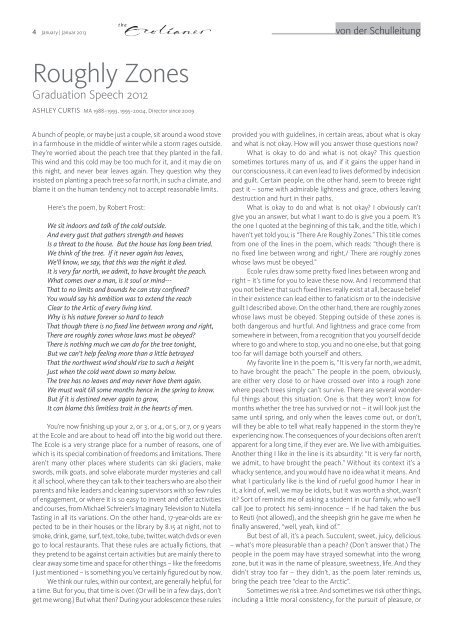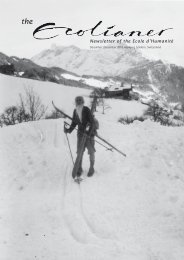Erfolgreiche ePaper selbst erstellen
Machen Sie aus Ihren PDF Publikationen ein blätterbares Flipbook mit unserer einzigartigen Google optimierten e-Paper Software.
4 January | Januar 2013<br />
the<br />
von der Schulleitung<br />
from the directors<br />
the<br />
January | Januar 2013 5<br />
Roughly Zones<br />
Graduation Speech 2012<br />
Ashley Curtis MA 1988–1993, 1995–2004, Director since 2009<br />
happiness, or deeper living – okay or not okay Don’t look for a<br />
handbook of regulations. It’s your call.<br />
Your call. From now on a lot of things are your call. Try to call<br />
well. But not too well. And not always well. Don’t plant your peach<br />
tree in the Arctic, but don’t always follow the rules in the gardening<br />
book, either. No risk, no fun. But on the other side: no limit, no life.<br />
I like to give the graduating seniors a symbolic present with<br />
their diplomas. This year I give you a poem and a peach. “There<br />
Are Roughly Zones” is in your diploma case. The peaches are in<br />
this basket. Eat the peach soon, or it will rot. The poem has been<br />
around since 1936, and will survive.<br />
A bunch of people, or maybe just a couple, sit around a wood stove<br />
in a farmhouse in the middle of winter while a storm rages outside.<br />
They’re worried about the peach tree that they planted in the fall.<br />
This wind and this cold may be too much for it, and it may die on<br />
this night, and never bear leaves again. They question why they<br />
insisted on planting a peach tree so far north, in such a climate, and<br />
blame it on the human tendency not to accept reasonable limits.<br />
Here’s the poem, by Robert Frost:<br />
We sit indoors and talk of the cold outside.<br />
And every gust that gathers strength and heaves<br />
Is a threat to the house. But the house has long been tried.<br />
We think of the tree. If it never again has leaves,<br />
We’ll know, we say, that this was the night it died.<br />
It is very far north, we admit, to have brought the peach.<br />
What comes over a man, is it soul or mind---<br />
That to no limits and bounds he can stay confined<br />
You would say his ambition was to extend the reach<br />
Clear to the Artic of every living kind.<br />
Why is his nature forever so hard to teach<br />
That though there is no fixed line between wrong and right,<br />
There are roughly zones whose laws must be obeyed<br />
There is nothing much we can do for the tree tonight,<br />
But we can’t help feeling more than a little betrayed<br />
That the northwest wind should rise to such a height<br />
Just when the cold went down so many below.<br />
The tree has no leaves and may never have them again.<br />
We must wait till some months hence in the spring to know.<br />
But if it is destined never again to grow,<br />
It can blame this limitless trait in the hearts of men.<br />
You’re now finishing up your 2, or 3, or 4, or 5, or 7, or 9 years<br />
at the <strong>Ecole</strong> and are about to head off into the big world out there.<br />
The <strong>Ecole</strong> is a very strange place for a number of reasons, one of<br />
which is its special combination of freedoms and limitations. There<br />
aren’t many other places where students can ski glaciers, make<br />
swords, milk goats, and solve elaborate murder mysteries and call<br />
it all school, where they can talk to their teachers who are also their<br />
parents and hike leaders and cleaning supervisors with so few rules<br />
of engagement, or where it is so easy to invent and offer activities<br />
and courses, from Michael Schreier’s Imaginary Television to Nutella<br />
Tasting in all its variations. On the other hand, 17-year-olds are expected<br />
to be in their houses or the library by 8.15 at night, not to<br />
smoke, drink, game, surf, text, toke, tube, twitter, watch dvds or even<br />
go to local restaurants. That these rules are actually fictions, that<br />
they pretend to be against certain activities but are mainly there to<br />
clear away some time and space for other things – like the freedoms<br />
I just mentioned – is something you’ve certainly figured out by now.<br />
We think our rules, within our context, are generally helpful, for<br />
a time. But for you, that time is over. (Or will be in a few days, don’t<br />
get me wrong.) But what then During your adolescence these rules<br />
provided you with guidelines, in certain areas, about what is okay<br />
and what is not okay. How will you answer those questions now<br />
What is okay to do and what is not okay This question<br />
sometimes tortures many of us, and if it gains the upper hand in<br />
our consciousness, it can even lead to lives deformed by indecision<br />
and guilt. Certain people, on the other hand, seem to breeze right<br />
past it – some with admirable lightness and grace, others leaving<br />
destruction and hurt in their paths.<br />
What is okay to do and what is not okay I obviously can’t<br />
give you an answer, but what I want to do is give you a poem. It’s<br />
the one I quoted at the beginning of this talk, and the title, which I<br />
haven’t yet told you, is “There Are Roughly Zones.” This title comes<br />
from one of the lines in the poem, which reads: “though there is<br />
no fixed line between wrong and right,/ There are roughly zones<br />
whose laws must be obeyed.”<br />
<strong>Ecole</strong> rules draw some pretty fixed lines between wrong and<br />
right – it’s time for you to leave these now. And I recommend that<br />
you not believe that such fixed lines really exist at all, because belief<br />
in their existence can lead either to fanaticism or to the indecisive<br />
guilt I described above. On the other hand, there are roughly zones<br />
whose laws must be obeyed. Stepping outside of these zones is<br />
both dangerous and hurtful. And lightness and grace come from<br />
somewhere in between, from a recognition that you yourself decide<br />
where to go and where to stop, you and no one else, but that going<br />
too far will damage both yourself and others.<br />
My favorite line in the poem is, “It is very far north, we admit,<br />
to have brought the peach.” The people in the poem, obviously,<br />
are either very close to or have crossed over into a rough zone<br />
where peach trees simply can’t survive. There are several wonderful<br />
things about this situation. One is that they won’t know for<br />
months whether the tree has survived or not – it will look just the<br />
same until spring, and only when the leaves come out, or don’t,<br />
will they be able to tell what really happened in the storm they’re<br />
experiencing now. The consequences of your decisions often aren’t<br />
apparent for a long time, if they ever are. We live with ambiguities.<br />
Another thing I like in the line is its absurdity: “It is very far north,<br />
we admit, to have brought the peach.” Without its context it’s a<br />
whacky sentence, and you would have no idea what it means. And<br />
what I particularly like is the kind of rueful good humor I hear in<br />
it, a kind of, well, we may be idiots, but it was worth a shot, wasn’t<br />
it Sort of reminds me of asking a student in our family, who we’ll<br />
call Joe to protect his semi-innocence – if he had taken the bus<br />
to Reuti (not allowed), and the sheepish grin he gave me when he<br />
finally answered, “well, yeah, kind of.”<br />
But best of all, it’s a peach. Succulent, sweet, juicy, delicious<br />
– what’s more pleasurable than a peach (Don’t answer that.) The<br />
people in the poem may have strayed somewhat into the wrong<br />
zone, but it was in the name of pleasure, sweetness, life. And they<br />
didn’t stray too far – they didn’t, as the poem later reminds us,<br />
bring the peach tree “clear to the Arctic”.<br />
Sometimes we risk a tree. And sometimes we risk other things,<br />
including a little moral consistency, for the pursuit of pleasure, or<br />
Spore forming capsule of a moss covered with ice



